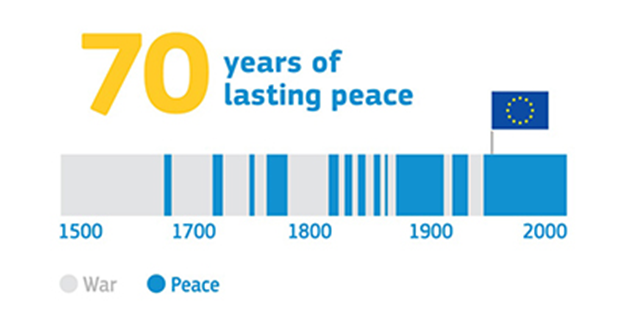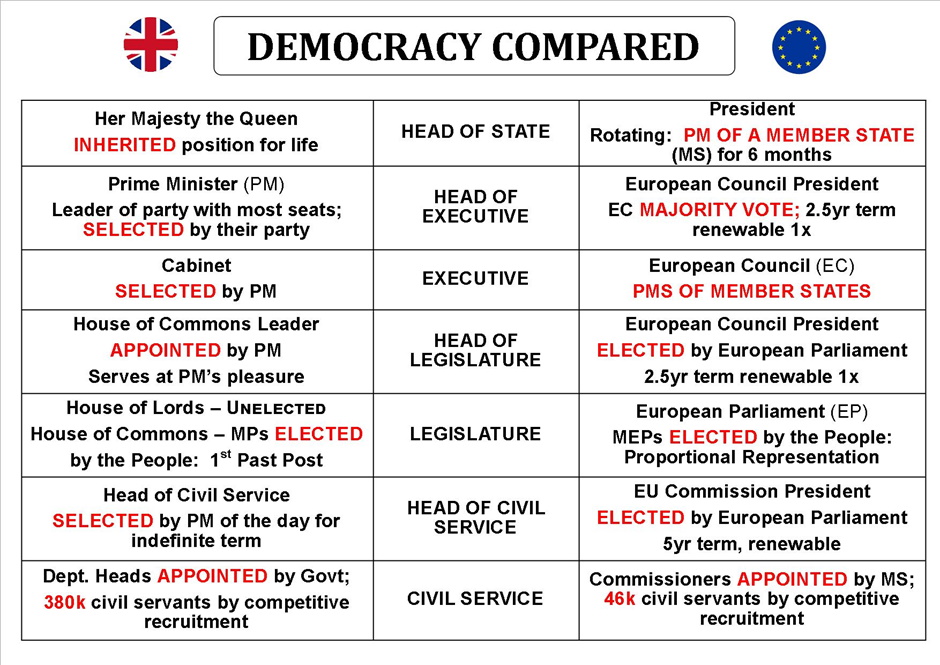UNITED IN DIVERSITY
“United in diversity”, the motto of the European Union, first came into use in 2000.
It signifies how Europeans have come together, in the form of the EU, to work for peace and prosperity, while at the same time being enriched by the continent’s many different cultures, traditions and languages.
Goals and values of the EU
Goals
The goals of the European Union are:
- promote peace, its values and the well-being of its citizens
- offer freedom, security and justice without internal borders
- sustainable development based on balanced economic growth and price stability, a highly competitive market economy with full employment and social progress, and environmental protection
- combat social exclusion and discrimination
- promote scientific and technological progress
- enhance economic, social and territorial cohesion and solidarity among EU countries
- respect its rich cultural and linguistic diversity
- establish an economic and monetary union whose currency is the euro
Values
The EU values are common to the EU countries in a society in which inclusion, tolerance, justice, solidarity and non-discrimination prevail. These values are an integral part of our European way of life:
1. Human dignity
Human dignity is inviolable. It must be respected, protected and constitutes the real basis of fundamental rights.
2. Freedom
Freedom of movement gives citizens the right to move and reside freely within the Union. Individual freedoms such as respect for private life, freedom of thought, religion, assembly, expression and information are protected by the EU Charter of Fundamental Rights.
3. Democracy
The functioning of the EU is founded on representative democracy. Being a European citizen also means enjoying political rights. Every adult EU citizen has the right to stand as a candidate and to vote in elections to the European Parliament. EU citizens have the right to stand as candidate and to vote in their country of residence, or in their country of origin.
4. Equality
Equality is about equal rights for all citizens before the law. The principle of equality between women and men underpins all European policies and is the basis for European integration. It applies in all areas. The principle of equal pay for equal work became part of the Treaty of Rome in 1957. Although inequalities still exist, the EU has made significant progress
5. Rule of law
The EU is based on the rule of law. Everything the EU does is founded on treaties, voluntarily and democratically agreed by its EU countries. Law and justice are upheld by an independent judiciary. The EU countries gave final jurisdiction to the European Court of Justice which judgements have to be respected by all.
6. Human rights
Human rights are protected by the EU Charter of Fundamental Rights. These cover the right to be free from discrimination on the basis of sex, racial or ethnic origin, religion or belief, disability, age or sexual orientation, the right to the protection of your personal data, and the right to get access to justice.

These goals and values form the basis of the EU and are laid out in the Lisbon Treaty and the EU Charter of fundamental rights.
In 2012, the EU was awarded the Nobel Peace Prize for advancing the causes of peace, reconciliation, democracy and human rights in Europe.
From economic to political union
The European Union is a unique economic and political union between 27 EU countries that together cover much of the continent.
The predecessor of the EU was created in the aftermath of the Second World War. The first steps were to foster economic cooperation: the idea being that countries that trade with one another become economically interdependent and so more likely to avoid conflict.
The result was the European Economic Community (EEC), created in 1958, and initially increasing economic cooperation between six countries: Belgium, Germany, France, Italy, Luxembourg and the Netherlands.
Since then, 22 other members joined and a huge single market (also known as the ‘internal’ market) has been created and continues to develop towards its full potential.
On 31 January 2020 the United Kingdom left the European Union.
What began as a purely economic union has evolved into an organization spanning policy areas, from climate, environment and health to external relations and security, justice and migration. A name change from the European Economic Community (EEC) to the European Union (EU) in 1993 reflected this.
Stability, a single currency, mobility and growth
The EU has delivered more than half a century of peace, stability and prosperity, helped raise living standards and launched a single European currency: the euro. More than 340 million EU citizens in 19 countries now use it as their currency and enjoy its benefits.
Thanks to the abolition of border controls between EU countries, people can travel freely throughout most of the continent. And it has become much easier to live, work and travel abroad in Europe. All EU citizens have the right and freedom to choose in which EU country they want to study, work or retire. Every EU country must treat EU citizens in exactly the same way as its own citizens for employment, social security and tax purposes.
The EU’s main economic engine is the single market. It enables most goods, services, money and people to move freely. The EU aims to develop this huge resource to other areas like energy, knowledge and capital markets to ensure that Europeans can draw the maximum benefit from it.
Transparent and democratic institutions
The EU remains focused on making its governing institutions more transparent and democratic. Decisions are taken as openly as possible and as closely as possible to the citizen.
More powers have been given to the directly elected European Parliament, while national parliaments play a greater role, working alongside the European institutions.
The EU is governed by the principle of representative democracy, with citizens directly represented at Union level in the European Parliament and Member States represented in the European Council and the Council of the EU.
European citizens are encouraged to contribute to the democratic life of the Union by giving their views on EU policies during their development or suggest improvements to existing laws and policies. The European citizens’ initiative empowers citizens to have a greater say on EU policies that affect their lives. Citizens can also submit complaints and enquiries concerning the application of EU law.
The EU in the world
Trade
The European Union is the largest trade block in the world. It is the world’s biggest exporter of manufactured goods and services, and the biggest import market for over 100 countries.
Free trade among its members was one of the EU’s founding principles. This is possible thanks to the single market. Beyond its borders, the EU is also committed to liberalising world trade.
Humanitarian aid
The EU is committed to helping victims of man-made and natural disasters worldwide and supports over 120 million people each year. Collectively, the EU and its constituent countries are the world’s leading donor of humanitarian aid.
Dipomacy and security
The EU plays an important role in diplomacy and works to foster stability, security and prosperity, democracy, fundamental freedoms and the rule of law at international level.
European Parliament Power Point Presentation
Resources for Teachers

